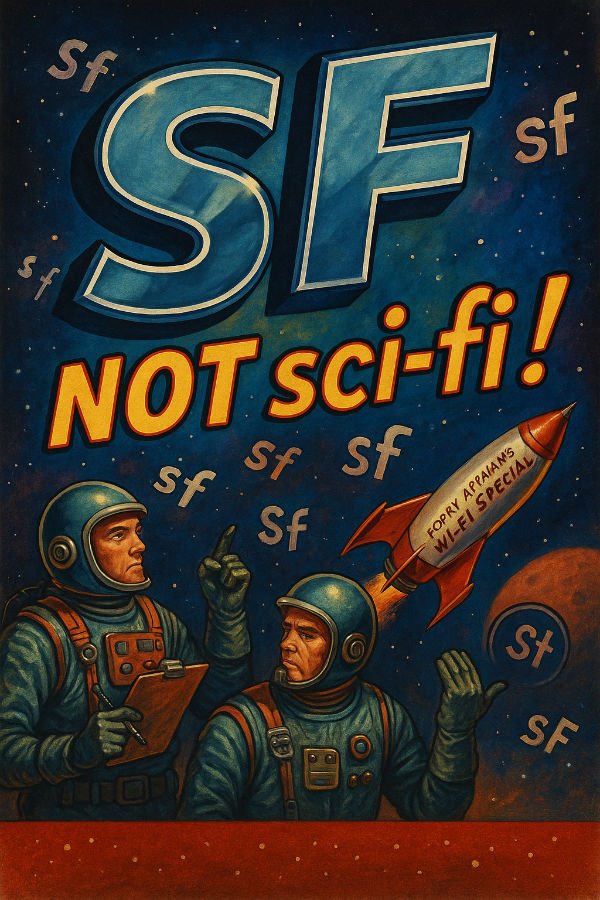SF: A Point Of Initials, an article by GF Willmetts.
Back in 2014 and a few times since, I’ve discussed the 17 sub-genres of science fiction, which included science fiction romance. I considered that article a bit of a misfire because it never quite found its audience. At the time, I hadn’t really factored in how identity-driven themes — stories centred on sexuality, gender, or cultural perspectives — might be considered their own subgenres. I remain unsure whether these count as distinct categories of science fiction in their own right, since they often seem more about character focus than about the speculative framework itself.
After all, science fiction has always been capable of embracing diversity without needing to badge it separately. When Samuel Delany introduced a Black protagonist in one of his stories, for example, it was striking partly because of the era in which he wrote. I’ll admit that when I first encountered Delany’s work, pre-Internet, I didn’t even know he was Black. The point is, SF has always been flexible enough to mix with any of the broader story traditions while accommodating new voices and perspectives.

Anyway, the discussion point for this article is in how we abbreviate science fiction. We’ll forget calling science fiction ‘sci-fi’ because it was a Forrest Ackerman pun to rhyme with ‘wi-fi’, which has to do with stereo systems to play music on. Additionally, according to my guide, the term is used to categorise low-quality science fiction, which diehard fans often associate with subpar SF TV series. https://sfcrowsnest.info/which-of-the-sf-sub-genres-is-safe-or-unsafe-and-why-an-examination-by-gf-willmetts-article/
In genre terms, science fiction is unique because the initials tend to be capped, hence always written as ‘SF’. There was an attempt back in the 1960s to identify it lowercased as ‘sf’. If I wrote, ‘Our genre is SF’, wouldn’t it stand out better if written as ‘SF’? Exactly. Even a hybrid like ‘Sf’ doesn’t feel right, and no one has attempted, as far as I can see, calling it ‘sF’ because it just looks weird, and who can type it easily like that?
Convention acronyms are supposed to be capped, although recently, the British press takes the likes of NASA as ‘Nasa’ as if it’s a word, ignoring conventional grammar. Acronyms, even if they look like a conventional word, need to be capped to avoid confusion with the word’s normal use. So, you would have SHIELD for Marvel’s security organisation, not a lowercase shield—the sort of thing Captain America throws around. It was once written as S.H.I.E.L.D. to distinguish it from regular words, but the dots have been removed. Being capped automatically means it’s an acronym.
This practice is mainly due to the increased number of people typing on the Internet, which can make including the dots seem like a slow process; however, all one needs to do is press the Caps Lock key and type phrases like ‘ergo U.N.C.L.E.’ In that case, it becomes acceptable to ignore the dots, but it is considered sloppy to lowercase the other letters. A lot of poor grammar mistakes have popped up over the years. Look at how people confuse ‘either’ and ‘neither’; they have different meanings, although it would be easy to distinguish them if individuals thought first and then just didn’t follow everyone else’s mistake. Either is a choice of two.
Neither means no choice at all. I think people originally got confused by the pronunciation, and no one bothered to tell any word processors to autocorrect to point out the error simply because the software isn’t useful for context. Let’s not even discuss the differences between our and American English and the use of the so-called ‘Oxford comma’, which essentially puts a comma after everything.
Please review the incorrect use of the semicolon, which seems to have resulted from frustration with using commas. Boredom is not an excuse for poor grammar. Effective grammar is getting it right and learning to be right all the time.
So what about science fiction? SF isn’t an acronym, just the initials, and it became acceptable long before Forry Ackerman. Publishers of the genre embraced this convenience. Look at the number of anthologies using it on the cover.
The words ‘Science Fiction’ take up a lot of cover space. ‘SF’ can be enlarged without occupying much space while still standing out. For a science fiction fan, it was instantly recognisable. We should take pride in the fact that capped initials are the only way to recognise this fictional genre. We can even pronounce it as ‘es-ef’, and it will sound correct.
For those of you who prefer having your writing assisted by AI, remind them of how ‘science fiction’ is abbreviated and that it should stay that way. We want to keep science fiction as a genre recognised by its capped initials and certainly not as sci-fi.
© GF Willmetts 2025
All rights reserved
Ask before borrowing

